Choosing between caffeine pills and coffee depends on your priorities. Pills offer a quick, portable, and precise way to boost alertness without fuss, while coffee provides faster effects, sensory pleasure, and social bonding. However, pills may lead to steadier doses and fewer digestive issues, whereas coffee can cause dehydration or stomach upset. To understand how each impacts health, convenience, and long-term use, explore the details that follow.
Key Takeaways
- Caffeine pills offer precise dosage, quick portability, and no brewing, making them convenient for on-the-go use.
- Coffee provides faster absorption, flavor variety, and social experiences, enhancing enjoyment and cultural connection.
- Pills reduce variability in caffeine intake, helping prevent jitters and crashes, while coffee’s brewing strength varies.
- Excessive caffeine from either source can cause health issues like increased heart rate, anxiety, or dehydration.
- Long-term use may lead to tolerance and dependence, requiring careful management regardless of the chosen caffeine source.
Speed of Absorption and Onset of Effects
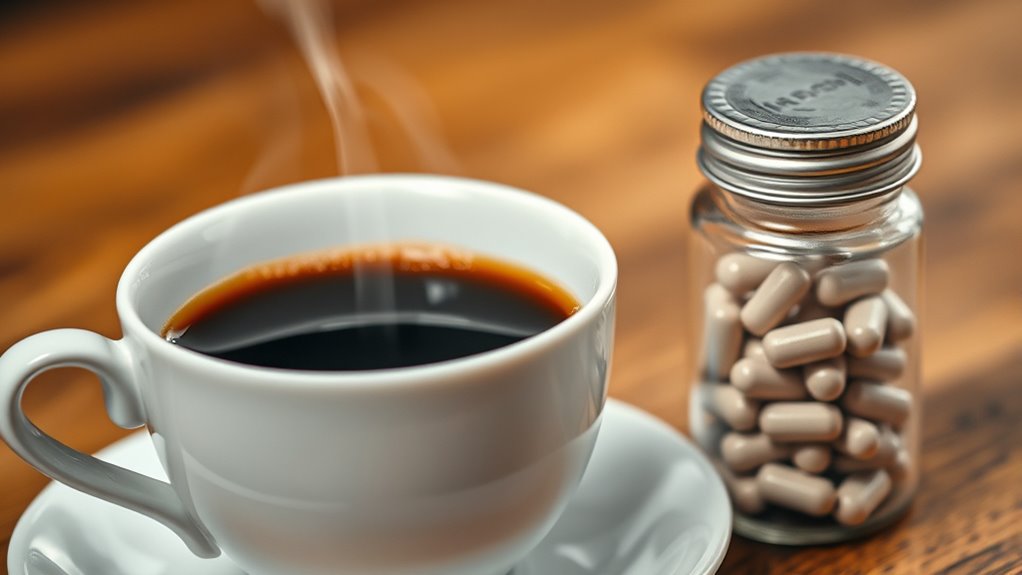
When comparing caffeine pills and coffee, the speed at which they’re absorbed into your body considerably impacts how quickly you feel their effects. Caffeine pills generally have a slower absorption rate because they need to dissolve in your stomach first, delaying their onset. In contrast, coffee contains liquid caffeine, which is rapidly absorbed through your stomach and small intestine, leading to a quicker effect. Your metabolism speed also plays a role; a faster metabolism can process caffeine more quickly, making effects hit sooner regardless of the source. With coffee, you’ll likely notice a rapid boost, while pills provide a more gradual increase. Understanding absorption rates can be influenced by individual factors such as gastric pH and overall health, further affecting how quickly you feel the caffeine’s impact. Additionally, metabolism speed varies among individuals, impacting how quickly caffeine is processed and its effects are felt. The timing of caffeine intake can also influence its effectiveness and your energy levels throughout the day. It’s important to consider that personal tolerance to caffeine can also alter your sensitivity to these different sources. Moreover, body composition plays a role in how caffeine is distributed and metabolized within your system.
Convenience and Portability
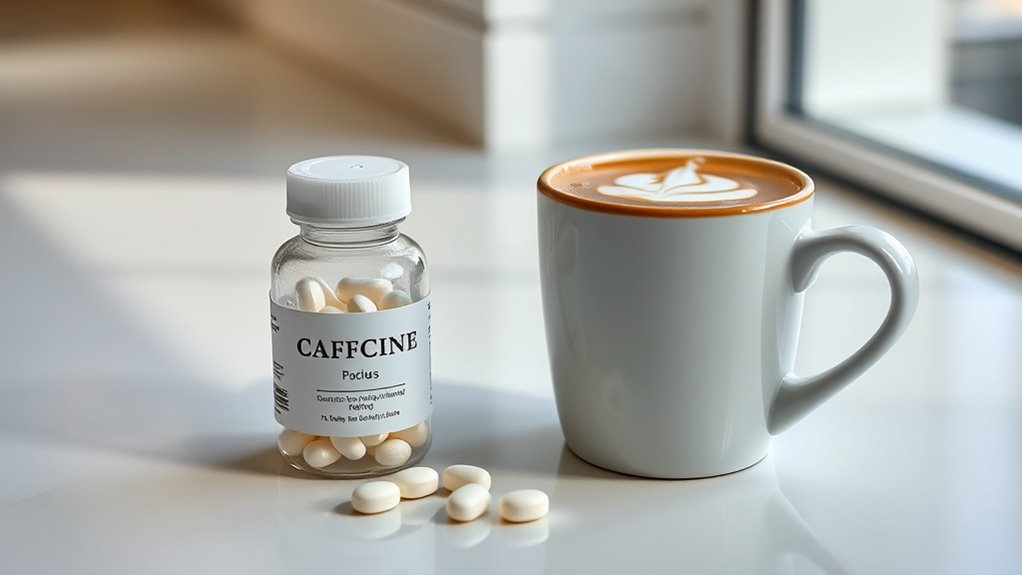
Caffeine pills are easy to carry and don’t require any special containers, making them perfect for on-the-go use. You can take them quickly without waiting for brewing or preparation. This convenience means you get your caffeine boost anytime, anywhere, without hassle. Additionally, their compact size can be advantageous for portable foraging, allowing you to maintain your energy levels during outdoor activities. Since they offer a consistent dosage, they also help in managing precise caffeine intake more effectively. Proper storage of caffeine pills can also prolong their shelf life and maintain potency, similar to how storage guidelines are important for other perishable products. Staying aware of market trends can also help you choose the most effective supplement options for your needs.
Easy to Carry
Both caffeine pills and coffee are designed to fit easily into your daily routine, but they differ considerably in portability. Caffeine pills are compact, lightweight, and slip easily into your pocket or bag, making them perfect for on-the-go use. Coffee, however, requires a mug or container, which adds bulk and can be less convenient when you’re rushing. Plus, coffee offers a wide flavor variety and holds cultural significance in many societies, enhancing your experience beyond just caffeine. Additionally, some types of gumball machines have become popular for their portability and convenience, similar to caffeine pills. When considering product portability, caffeine pills generally outperform coffee in ease of transport and quick consumption.
Quick Consumption Method
The ease of quickly consuming caffeine depends largely on its form. Caffeine pills offer a fast, straightforward way to boost energy without any brewing or measuring. Simply swallow a pill, and you’re set. Coffee, on the other hand, provides flavor variety that can make each cup enjoyable, fueling social interaction whether at a cafe or with friends. Pills are discreet and portable, perfect for on-the-go moments when convenience is key. Coffee’s quick consumption depends on how it’s prepared, but it usually involves a quick sip rather than a full brewing process. Both options allow rapid intake, but pills excel in portability and consistency, while coffee’s flavor variety encourages social connection. Additionally, automation in business has made coffee brewing more efficient in some cafes, enabling faster service for customers. Your choice depends on whether convenience or social experience matters most to you, highlighting the importance of caffeine delivery methods in daily routines. Moreover, eye patch benefits can be maximized when used consistently as part of a skincare routine to maintain eye health.
No Brewing Needed
Caffeine pills and coffee each offer quick ways to boost energy, but pills have a clear advantage when it comes to no brewing needed. With pills, you can easily take your caffeine anywhere without worrying about brewing equipment or spills. This makes them highly convenient and portable, perfect for busy mornings or travel. Unlike coffee, which offers a rich flavor variety, pills lack that sensory experience but excel in simplicity. Additionally, coffee often fosters a social experience, as people gather around cafes, sharing flavors and conversations. Pills, on the other hand, prioritize quick access over social interaction.
- No need for brewing equipment or filters
- Easy to carry in a pocket or bag
- Quick, discreet consumption for on-the-go energy
Consistency and Dosage Control

You can easily control your caffeine intake with pills because they offer precise dose measurement. This helps you maintain regular intake patterns and avoid sudden spikes in energy. Consistent stimulant levels make it simpler to manage your alertness throughout the day. Additionally, filter replacement in devices like air purifiers demonstrates the importance of regular maintenance to sustain optimal performance. Being aware of natural signs and weather forecasting techniques can also help in planning your caffeine consumption around daily routines. Monitoring pimple patch effectiveness can be an example of tracking product performance over time to optimize skin care routines. Understanding nutritional benefits of juices can further support balanced health choices and dietary management.
Precise Dose Measurement
Achieving consistent effects depends heavily on precise dose measurement, whether you’re taking caffeine pills or brewed coffee. Without accurate measurement, you risk over- or under-consuming caffeine, which can impact your focus and energy levels. Caffeine pills offer a straightforward, controlled dose, ensuring you get a predictable boost every time. Coffee, on the other hand, provides flavor variety and a social experience, making it appealing but less precise. To maximize consistency, consider factors like brewing strength and serving size. Being mindful of these elements helps you maintain steady caffeine intake and avoid unwanted jitters or crashes. Whether you prefer the consistency of pills or the social aspect of coffee, precise dose measurement is key to managing your caffeine effects effectively. Standardized dosing for predictability helps you better control your intake and effects.
Regular Intake Patterns
Maintaining a consistent intake pattern is key to managing caffeine’s effects and avoiding unwanted side effects like jitters or crashes. When you stick to a regular schedule, you help your body adapt and prevent sudden spikes or drops in energy. Pay attention to taste differences, especially if you switch between coffee and caffeine pills, as flavor can influence your consumption habits. Cultural preferences also play a role; some cultures favor daily coffee rituals, while others prefer sporadic caffeine intake. By controlling your dosage and timing, you can enjoy the benefits without overdoing it. Consistency helps you better gauge your tolerance and keeps your energy levels stable throughout the day. This approach promotes healthier habits and minimizes the risk of dependence. Additionally, understanding sound healing science can offer insights into how external stimuli might influence your overall well-being, reinforcing the importance of balance in your caffeine routine. Incorporating caffeine consumption patterns into your daily routine can further optimize your intake and enhance your overall experience. Regular monitoring of intake levels can also help in recognizing tolerance development early, allowing for timely adjustments to avoid increased dependency. Recognizing the differences in electric bike performance can help you tailor your caffeine intake to match your activity level and energy demands.
Consistent Stimulant Levels
Consistent stimulant levels are essential for maximizing benefits and minimizing side effects from caffeine. Maintaining timing consistency ensures your body receives caffeine at regular intervals, preventing crashes or jitters. Absorption stability helps keep your stimulant levels steady, avoiding peaks and dips that can disrupt focus or cause anxiety. When you control dosage precisely—whether through pills or measured coffee—you reduce the risk of overconsumption. To optimize this, consider:
- Scheduling caffeine intake to promote timing consistency
- Choosing formats with predictable absorption rates
- Monitoring your body’s response for steady stimulant levels
Potential Health Risks and Side Effects
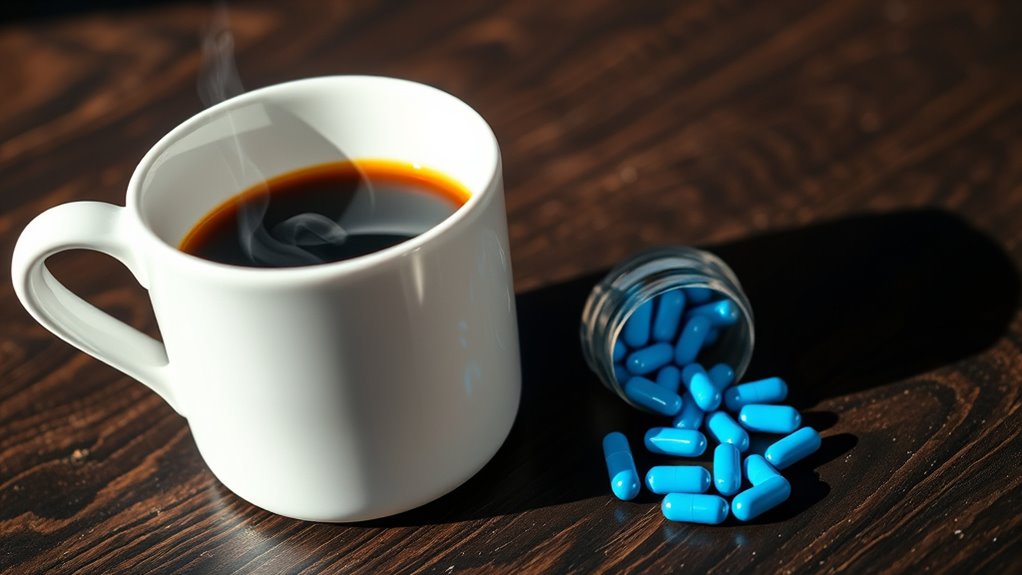
While caffeine can boost your energy and alertness, it also carries potential health risks and side effects that you should consider. Excessive intake may lead to cardiovascular risks, such as increased heart rate and blood pressure, and worsen anxiety or cause sleep issues. Some people experience jitters, headaches, or stomach upset. High doses can trigger mental health effects like nervousness or irritability. Awareness of these risks helps you avoid overconsumption and maintain balance.
| Effect | Symptoms | Caution |
|---|---|---|
| Cardiovascular risks | Rapid heartbeat, high BP | Limit caffeine to safe levels |
| Anxiety and jitters | Nervousness, restlessness | Watch for signs of overstimulation |
| Sleep disturbances | Insomnia, poor rest | Avoid caffeine late in the day |
| Headaches | Throbbing, tension | Moderate intake to prevent dependence |
| Digestive issues | Upset stomach, acid reflux | Monitor your body’s response |
Impact on Hydration and Digestion
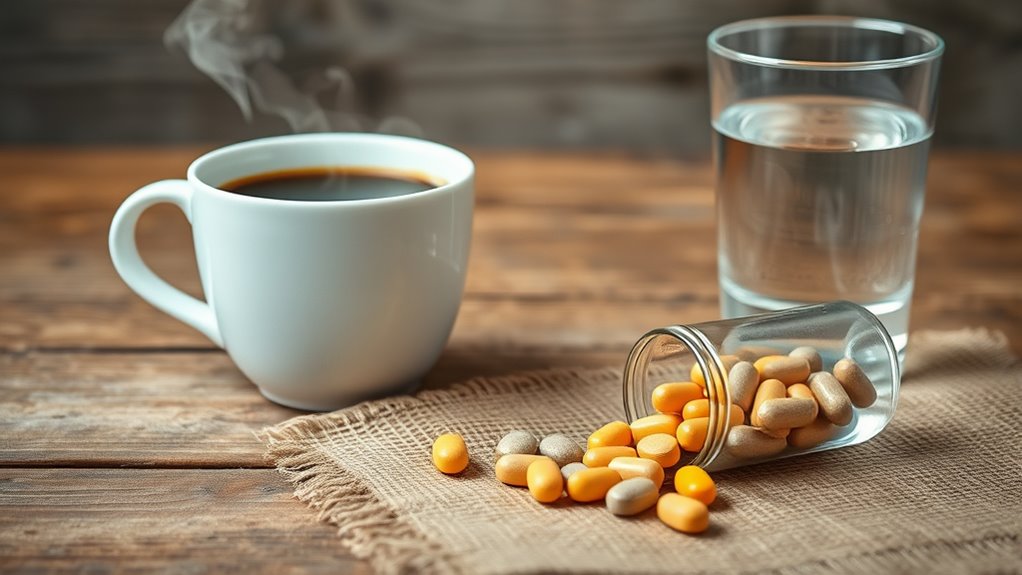
Caffeine can affect your hydration levels and digestion, especially if consumed in large amounts. Its hydration effects may lead to dehydration because caffeine acts as a mild diuretic, increasing urine production. Additionally, the digestion impact varies between caffeine pills and coffee; pills are absorbed quickly, potentially causing stomach discomfort or acid reflux, while coffee’s acidity can irritate your digestive tract. To understand these effects better:
- Caffeine’s diuretic properties can decrease overall fluid intake if not balanced with water.
- Coffee’s acidity might lead to indigestion or heartburn in sensitive individuals.
- Caffeine pills, lacking the water content of coffee, may intensify dehydration risks if consumed excessively.
Monitoring your intake helps mitigate hydration issues and digestive discomfort, regardless of the caffeine source.
Cost and Accessibility
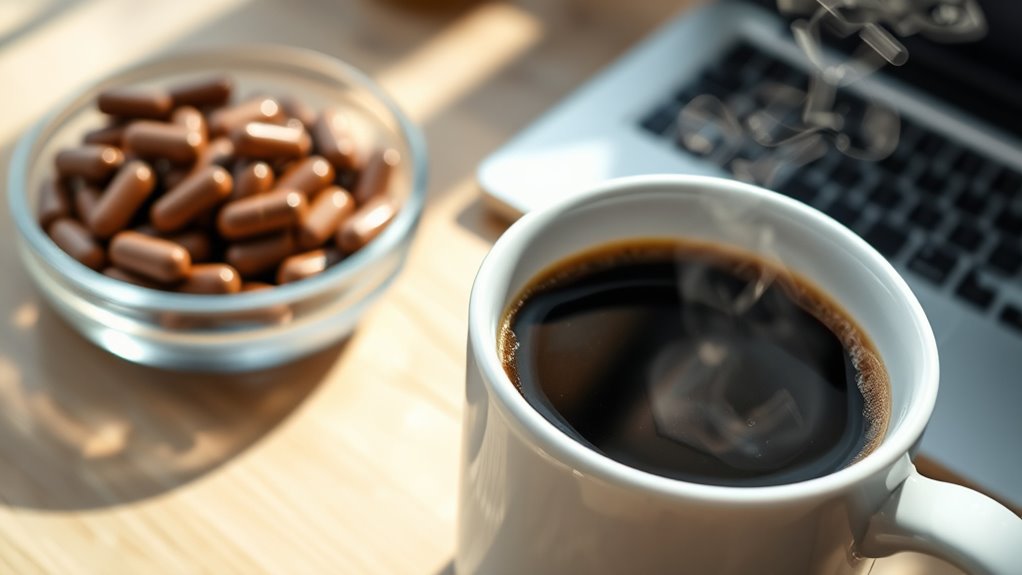
When comparing caffeine pills and coffee, cost and accessibility play significant roles in your choice. The cost comparison shows that coffee can be cheaper if you brew it at home, with minimal ongoing expenses for beans and filters. Caffeine pills, however, often come in larger quantities, making them more cost-effective over time. Accessibility factors also matter—you can find coffee shops almost anywhere, making coffee highly convenient, especially when you’re on the go. Caffeine pills are available at pharmacies and online, providing easy access regardless of location. If convenience is a priority, caffeine pills might be preferable, but if you want a budget-friendly option, brewing coffee at home usually costs less. Your decision hinges on balancing affordability with how easily you can get your caffeine fix.
Long-term Implications for Dependence and Tolerance
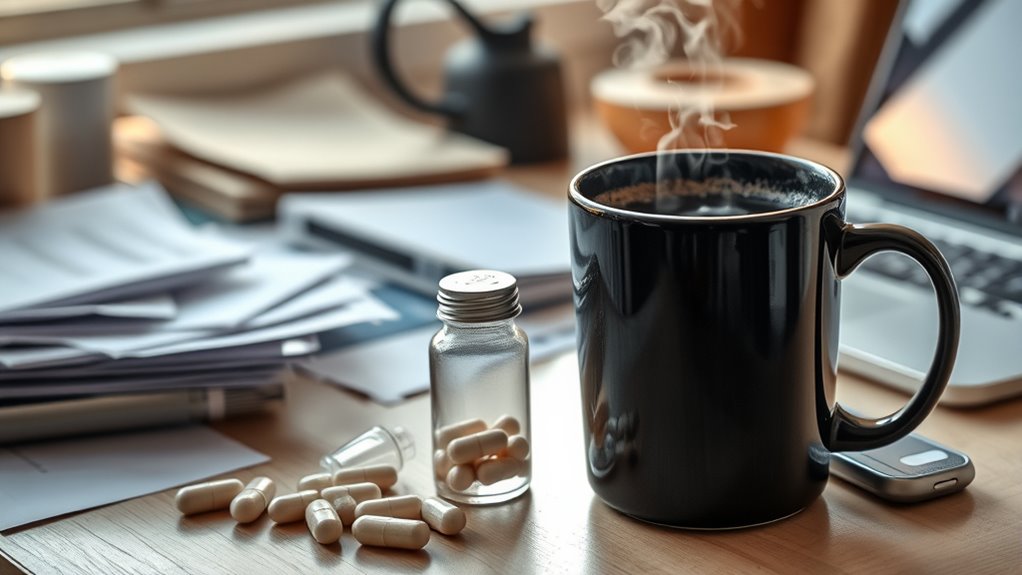
Choosing between caffeine pills and coffee not only affects your immediate alertness but also influences your long-term reliance on caffeine. As you consume caffeine regularly, tolerance buildup can occur, reducing its stimulating effects over time. This may lead you to increase your intake, heightening dependence risks. Long-term dependence can make it difficult to function without caffeine and may cause withdrawal symptoms like headaches or fatigue if you suddenly stop. To manage these implications, consider the following:
- Monitor your consumption to prevent excessive reliance
- Rotate caffeine sources to avoid tolerance buildup
- Be aware of withdrawal symptoms and plan gradual reductions
Frequently Asked Questions
Which Method Provides More Sustained Energy Throughout the Day?
You want sustained energy throughout the day, so consider how timing consistency and dosage control matter. Caffeine pills often offer more precise dosage, helping you maintain steady energy levels without spikes. Coffee, on the other hand, can be inconsistent in strength and timing, leading to fluctuations. By choosing pills, you can better regulate your intake, ensuring longer-lasting energy without the crashes that come from variable coffee consumption.
Are Caffeine Pills Safer for Sensitive Individuals Than Coffee?
Imagine you’re sensitive to caffeine’s effects, and you wonder if pills are safer than coffee. While pills offer better dosage control, they can still pose health risks if misused. For sensitive individuals, sudden spikes in caffeine levels can cause jitters or heart palpitations. Always check your health risks and consult a healthcare professional. Pills aren’t inherently safer but can be more controlled, reducing some risks if used responsibly.
How Do Caffeine Pills Affect Sleep Quality Compared to Coffee?
You might notice that caffeine pills can cause more sleep disruption than coffee because they deliver a concentrated dose quickly, making it harder to fall asleep and reducing the restorative quality of your rest. Coffee, with its slower absorption, might have a milder impact if consumed earlier in the day. To protect your sleep, avoid caffeine at least six hours before bedtime, regardless of the form you choose.
Can Caffeine Pills Cause Withdrawal Symptoms Faster Than Coffee?
Imagine your caffeine addiction as a rollercoaster, and caffeine pills are the lightning-fast drops. You might experience withdrawal symptoms faster with pills due to their rapid onset and dosage consistency, which keeps your body hooked more efficiently. Coffee releases caffeine more slowly, giving your system a gentler ride. So yes, caffeine pills can cause withdrawal symptoms quicker, making your crash come sooner and with more intensity.
Are There Any Differences in Mental Alertness Between the Two?
You’ll notice differences in mental alertness between caffeine pills and coffee. Pills provide a more concentrated dose, offering quicker cognitive enhancement and sustained energy, which helps with focus and productivity. Coffee, on the other hand, delivers a broader experience, including mood regulation through additional compounds like antioxidants. Your choice affects how sharply you stay alert and how stable your mood remains, depending on your preference for immediate boost or a more balanced mental state.
Conclusion
Whether you choose caffeine pills or coffee, knowing their pros and cons helps you make smarter choices. Sure, pills offer quick, precise doses, but coffee provides a comforting, natural caffeine boost. Don’t worry about dependence—moderation is key. By understanding how each affects your body, you can enjoy your favorite pick-me-up safely and effectively. Ultimately, it’s about finding what works best for you, so you stay energized without sacrificing your health.









